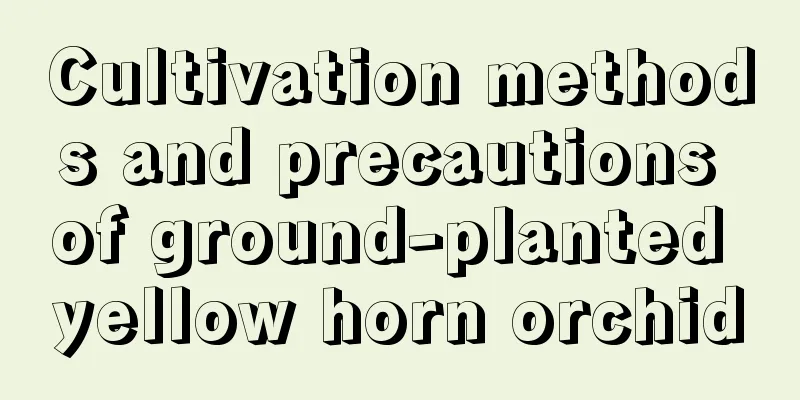Cultivation methods and precautions of ground-planted yellow horn orchid

|
Yellow horn orchid , also known as white orchid , is a very common flower with upright branches, lush green leaves, and elegant white flowers. It is very popular. Below we will introduce to you the cultivation methods and precautions of ground-planted yellow horn orchid. 1. Pot soil When choosing potting soil for domestic yellow horn orchid, try to choose one that is loose and breathable, rich in humus. Choose a clay pot, a purple clay pot, or a plastic pot with many small holes at the bottom that has good ventilation, put the soil in it, and the potting soil is ready. 2. Lighting Yellow horn orchid is a sun-loving tree species and is not shade-tolerant. If it is a potted plant , it needs to be placed in a sunny south-facing position, with appropriate shade in the summer and the temperature not lower than 5℃ in the winter. However, it should not be placed near a heater to avoid burns. 3. Moisture Yellow horn orchid likes a humid environment, is not drought-tolerant, and is not water-tolerant. It is relatively difficult to maintain. Therefore, in terms of soil configuration, choose loose and breathable leaf mold mixed with sandy soil for cultivation. When watering, keep the soil moist without water accumulation. If you don't water it, then don't water it. If you do water it, water it thoroughly. Increase the frequency of watering appropriately in summer, and move the plant indoors in winter when the temperature is slightly lower, so reduce the frequency of watering to avoid waterlogging and root rot. If the leaves turn yellow, it is usually caused by overwatering, so stop watering and observe. 4. Fertilization Yellow horn orchid likes fertilizer. If there is insufficient nutrition, it will not be easy to bloom. Therefore, bone meal, cake crumbs or animal hoof slices can be mixed into the soil as base fertilizer. During the growing season, alum fertilizer water and potassium dihydrogen phosphate should be used alternately for fertilization, generally once a week, with thin fertilizers applied frequently. 5. Pruning During the growth process of yellow horn orchid, the plant should be shaped and pruned, diseased and dead branches and overgrown branches should be cut off, and some of the lower leaves should be removed to inhibit the growth of the plant and promote bud formation and flowering. 6. Pests and diseases Yellow horn orchid is susceptible to diseases and pests, so ventilation and disease prevention should be strengthened, especially to prevent damage by red spider mites. If the leaves of the plant are found to be turning yellow and falling off, the cause should be found. In addition to spraying pesticides, the pot should be moved to a cool place, watering should be controlled to avoid the spread. That’s it |
<<: How can Parthenocissus tricuspidata grow fast? Does it shed its leaves in winter?
>>: Can peony survive by cuttings? How to propagate peony by cuttings
Recommend
Reasons why daffodils do not bloom, how to promote daffodil flowering
1. Insufficient light Reason: Daffodils need suff...
How to prune camellia
When to prune camellia Camellias are usually prun...
What fertilizer to apply to promote camellia flowering (what fertilizer is best to apply during camellia flowering)
Camellia is very popular in autumn and winter. It...
Is Kalanchoe suitable for indoor cultivation?
one. Is it toxic? This flower is non-toxic and ca...
How to grow the branched apricot so that it will bloom out of the pot easily?
The ramified apricot is a succulent plant that is...
Sweet potato seedling raising time and method
Sweet potatoes have strong storage resistance and...
What crops are suitable for growing in Yuncheng?
What crops are suitable for growing in Yuncheng? ...
Flowers with long flowering period, beautiful appearance and easy to grow
1. Geranium The flowers of this flower are very b...
How to take care of newly bought mint
1. How to grow the mint you just bought Mint will...
When is the best time to plant chive seeds?
Leek seed planting time Chives are a perennial he...
How to prune dragon fruit
When to prune dragon fruit The best time to prune...
How to grow money tree to make it flourish
1. Repot every year If you want the money tree to...
Growth environment and characteristics of wintersweet
Wintersweet Growth Environment and Conditions Win...
How to maintain the seaweed ball
Seaweed ball growth conditions Seaweed balls are ...
What is the scientific name of coriander and what are its benefits?
1. Scientific Name Its Chinese name is coriander,...









